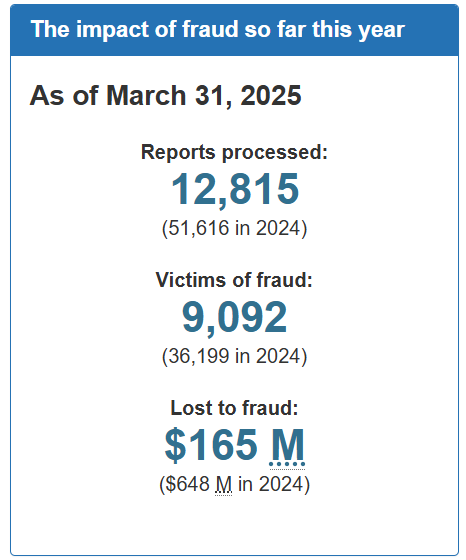
Over 2,300 Canadians fall prey to scammers, says report

With many Canadian workers struggling financially, job scams are proving to be another thorn in their side, according to a recent report.
More than 2,300 Canadians reported falling victim to job and employment scams, and collectively lost over $49 million to fraudsters.
However, the actual number of victims may be significantly higher, said Jeff Horncastle, client and communications outreach officer at the Canadian Anti-Fraud Centre (CAFC), in talking to the Daily Hive.
“Fraud is significantly underreported in Canada, with conservative estimates putting reporting to the CAFC at only five to 10 per cent of incidents,” he said the report. “There are many reasons for under-reporting to the CAFC, including victims not knowing where and what to report, and victims being too ashamed or embarrassed to report.”
The issue appears to be worsening over time. Losses have quadrupled from 2022 to 2024, and the value of individual job scams is also rising.
Between January and March 2025 alone, Canadians had already lost a total of $22.7 million from overall fraud, according to CAFC.

Cryptocurrency-related job scams are a significant driver of the surge, Horncastle told Daily Hive.
Scammers have also found a new way to defraud job hopefuls, using generative AI to create fake job ads that they then use to steal money and identities, according to a previous report.
As hiring will continue to be a challenge for many Canadian employers, and fake job postings are adding to companies’ recruitment troubles, according to a previous survey. Specifically, a majority of hiring managers (57%) are aware of such scams, and 45% are concerned about their company name being illegitimately used for a job post scam, reports Express Employment Professionals.
Here are some variations of job scams, according to the CAFC:
Car wrapping - Scammers send an unsolicited message telling people that they can earn $300 to $500 per week by wrapping their car, truck, SUV or bike with a "company" logo. If a person responds, they receive instructions and a contract followed by a cheque in the mail. The scammers instruct the person to deposit the cheque into the person’s account, and withdraw some of the funds. Then, the scammer directs the person to deposit the money into a specific bank account to pay a graphics company and/or other fees. At this point, the person learns that the cheque is counterfeit and they’re responsible for any funds withdrawn.
Counterfeit cheque - In this scam, a scammer sends a text message or email to people who post their resumes online, offering them a job. Job offers include the following positions: caregiver, administrative assistant, data entry clerk. The scammer then sends the people a counterfeit cheque with a story about why they need help to cash it. They ask the person to cash it and return some of the funds to the fraudster.
Crypto job fraud - Scammers will contact a person by text message, WhatsApp, email or Messenger after the applicant has shared their resume and contact information on job recruitment websites. They might send a small payment or commission to convince the person that the job is legitimate. Scammers will then tell the person they can earn higher commissions or "move up a level" by boosting more products but you need to pay fees to gain access to the additional work. However, funds are deposited into crypto accounts or wallets, and the person cannot withdraw the funds they have deposited and earned.
“Never agree to receive funds into your personal bank account to forward elsewhere, there is a good chance you are being used as a money mule and contributing to money laundering,” said CAFC. “You may also be asked to recruit people to get higher earnings. This is pyramid selling and is illegal in Canada. It's a criminal offence to promote a scheme of pyramid selling.”
Financial agent - Scammers will try to recruit people with a job offer through unsolicited email or text message, online classified ads or job posting websites. The job may be called a "financial agent" or "client manager". When the person answers the offer, the scammers hire them as a payment processor for the suspect company. The recruit’s job is to receive payments from the company's clients. The person will receive e-transfers or wire transfers into their bank account. The scammers then direct the recruit to send money through Bitcoin to a company representative. The money received is either from compromised accounts or other fraud victims. The scam has made the recruit a money mule, and they can be “arrested for money laundering,” said CAFC.
Mystery shopper - Scammers send people a notice that they’ve been selected to be a mystery shopper, quality control officer, client service strategist or personal assistant. The notice includes a cheque and some instructions. The scammer asks the person to deposit the money into their personal bank account and to transfer a large part of the money into a specific bank account. “The fraudsters may also ask you to make small purchases, such as gift cards, and to provide the numbers to them to confirm that they work,” said CAFC.
“At every step, the scammer asks you to complete and submit a customer service survey based on your experiences. The surveys are a prop to convince you the job is real. You later find out that the cheque you deposited is fake and you now owe money to the bank.”
Employers play a crucial role in safeguarding job seekers from employment scams, according to Indeed. Here are several strategies to help employers protect candidates and uphold the integrity of their hiring processes, according to the job board:
Reports of job scams surged by 118% in 2023 compared to the previous year, as detailed in a CNBC article, citing a recent report by the Identity Theft Resource Center (ITRC).